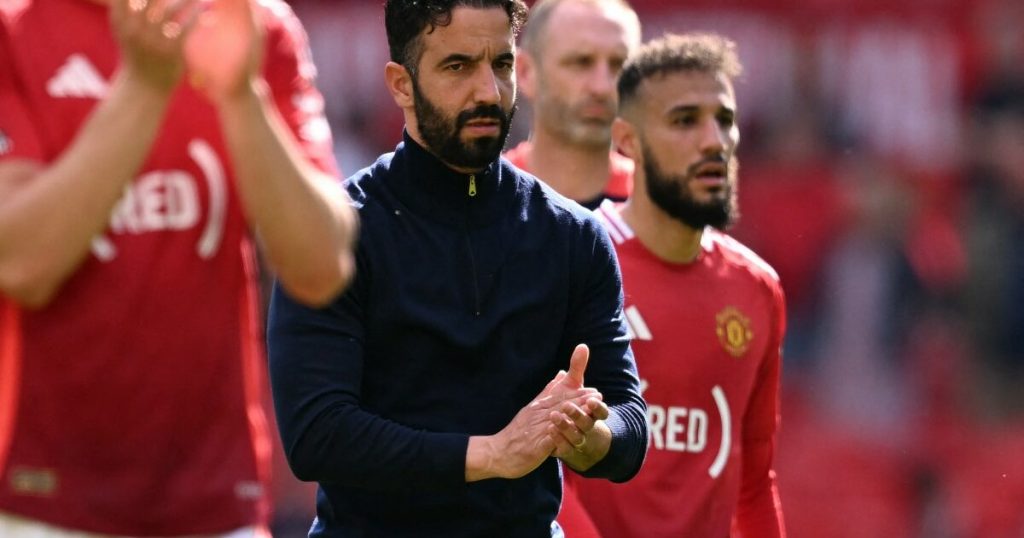The conclusion of Manchester United’s dismal 2023-24 season was marked not by jubilation or even quiet reflection, but by the resounding disapproval of their fans. Finishing a shocking 15th in the Premier League and failing to secure any silverware, the team embarked on a post-season tour of Asia, hoping perhaps for a change of scenery and a chance to reconnect with their international fanbase. Instead, they were met with a stark reminder of their failings, suffering a 1-0 defeat to a Southeast Asian XI in Kuala Lumpur, a performance that elicited boos from the stands as the players trudged off the pitch. This embarrassing loss served as a harsh punctuation mark on a season riddled with disappointment and underperformance.
Manager Ruben Amorim, who had taken the reins mid-season from the departed Erik ten Hag, found himself facing the unenviable task of navigating the team through this turbulent period. He acknowledged the difficulty of facing fans around the world after such a poor season, admitting that the tour presented a challenging moment for the club. While acknowledging the need for the team to engage with their supporters, particularly on such international tours, Amorim also emphasized the importance of facing the music and accepting the fans’ displeasure. He stressed that the players could not hide from the criticism and had to accept responsibility for their performances. This sentiment underscored a fundamental truth about Manchester United: the club’s stature and history demand accountability and a constant striving for excellence.
Amorim admitted that the team’s performance in Kuala Lumpur lacked focus, a symptom perhaps of the exhaustion and demoralization that had accumulated over a long and arduous season. He expressed empathy for both the fans and the players, recognizing the frustration and disappointment on both sides. The manager acknowledged the desire to provide the fans with something positive, a glimmer of hope amidst the gloom, but admitted the difficulty of achieving this given the current circumstances. The loss, coupled with the fans’ reaction, further compounded the pressure on Amorim and his players as they prepared for their next friendly against Hong Kong’s representative team.
The experience of managing Manchester United, Amorim reflected, had proved to be a steep learning curve. He realized that the role demanded more than just tactical acumen and coaching expertise. It required personal growth, leadership development, and the ability to manage emotions under intense scrutiny. He admitted to his own struggles with frustration, acknowledging the need for greater emotional control, particularly in the face of adversity. Amorim’s candid reflections highlighted the unique pressures associated with managing one of the world’s biggest football clubs, where expectations are perpetually high and scrutiny is relentless. He recognized that positive results often mask underlying issues and that true leadership is tested during periods of struggle.
The backdrop for the Hong Kong friendly was a rain-soaked stadium, mirroring the gloomy atmosphere surrounding the team. Amorim, understandably, was eager to avoid any further injuries that could exacerbate the already difficult situation. He tried to find a positive spin on the inclement weather, jokingly remarking that it made the team feel at home, a reference to Manchester’s often rainy climate. Beyond the attempt at humor, however, lay a serious concern: the need to protect his players and finish the season without further setbacks. The heavy rain posed an added challenge, increasing the risk of injury and adding another layer of complexity to the already daunting task facing the manager.
The post-season tour to Asia, intended perhaps as a chance to rebuild bridges with fans and offer a glimpse of a brighter future, instead became a stark reminder of the deep-seated problems plaguing Manchester United. The boos that echoed around the stadium in Kuala Lumpur were not simply a reaction to a single poor performance; they were a manifestation of the accumulated frustration and disappointment of a fanbase accustomed to success. For Amorim, the tour became a harsh lesson in the realities of managing Manchester United, a role that demands not only tactical prowess but also resilience, leadership, and the ability to navigate the intense pressures that come with the territory. As the rain poured down on the Hong Kong Stadium, the future of Manchester United remained shrouded in uncertainty, with the echoes of boos serving as a stark reminder of the work that lay ahead.


